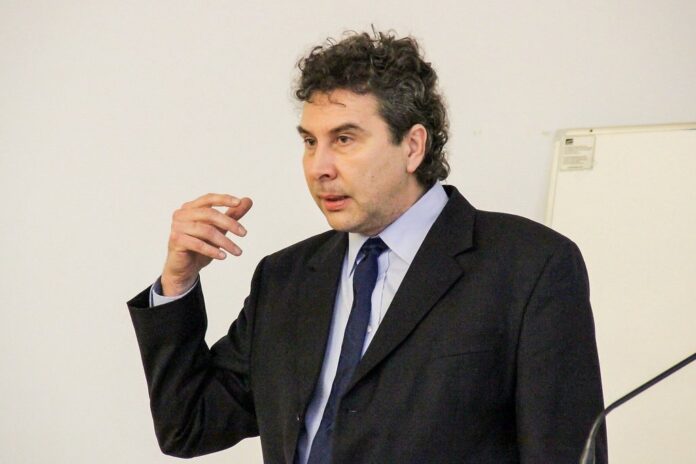On September 23, the Russian Foreign Intelligence Service published an alarmist statement: Brussels is plotting to rig the elections, NATO is massing troops on the border, and Transnistria is the scene of armed provocations. The text is full of semantic contradictions – “totalitarian-liberal regimes”, “dictatorship under the guise of democracy” – and resembles a propaganda pamphlet rather than an intelligence analysis, the IPN reports.
Its value is not informative, but strictly psychological. The Kremlin knows that it can no longer stop the modernization and democratization process of the Republic of Moldova by force and resorts to the weapon it masters best: poisoning the public space, fueling distrust and cultivating fear before a decisive electoral moment.
And these hysterical accents only betray Moscow’s true fear: that, through the vote on September 28, the citizens of Moldova will confirm the country’s European direction and the irreversible separation from the orbit of the “Evil Empire”, as Ronald Reagan once called it.
The numbers that matter
Today, 61% of Moldovan citizens support accession to the European Union, while only a quarter are still against it. Moreover, 86% of respondents consider the relationship with the EU to be good, increasing compared to last year. This is a clear and stable majority, which slogans manufactured in Moscow’s propaganda laboratories cannot overturn.
However, the European path is not without its fragility. In 2024, the referendum to amend the Constitution, so that the objective of EU accession would become a state commitment, was narrowly won: 749,719 votes in favor, 739,155 against. The difference was made by the mobilization of the diaspora. A clear lesson: the European will exists, but it must be defended by presence at the polls.
The EU is not just an abstract promise. Between 2021 and 2025, Brussels mobilized almost 200 million euros for reforms and development in Moldova, and over 19 thousand small and medium-sized enterprises benefited from support through European programs. In contrast, Russia remained consistent in two directions: energy blackmail and propaganda.
From the periphery of the Russian world, to the center of Europe
Sunday’s elections are not a simple competition between parties. They are, in reality, a referendum on national destiny: between remaining captive in a colonial-inspired Russian periphery or returning to the natural European space, alongside Romania, in a community of security and prosperity.
Moscow wants the Republic of Moldova vulnerable, divided, stuck in a gray area. For this, it allocates hundreds of millions of dollars, including for corrupting voters and buying a future parliamentary majority. It is the same logic that Moscow has always applied in the region. The Ribbentrop-Molotov Pact of 1939 annulled Moldova’s sovereignty and transformed it into an impoverished and terrorized province, subject to the arbitrariness of the gerontocratic leaders in the Kremlin. The same lack of freedom is being paid for today by Ukraine and Georgia, faced with wars and occupations designed to keep them captive in an oppressive “zone of influence” imposed by the current gerontocratic leaders in Moscow.
The consequences of Soviet rule are deeply etched in the memory of the Republic of Moldova: the massive post-war deportations that emptied entire villages, and the famine of 1946-1947, caused by forced requisitions, that killed tens of thousands of people. They are not just pages of history, but warnings about what it means to live without freedom and the right to decide one’s own future: poverty, terror and humiliation.
Today, Europe does not ask the Republic of Moldova to give up its sovereignty, but to strengthen it. The European Union offers the chance to build a secure and prosperous life, to strengthen democratic institutions and to be recognized as part of a community of free and equal nations. Therefore, every vote cast on Sunday will be more than a political choice: it will be a declaration of dignity and belonging to European civilization.
The strongest response to the Kremlin’s panicky statements is not indignation, but participation. A massive vote on September 28 is the antidote to lies. It is proof that Moldova has understood that its destiny is not decided in Moscow, but in Chisinau, in the cities and villages of the republic.
Every vote counts
Today, Russian propaganda is trying to convince that the future is already written, that Europe means dictatorship and that Moldova has no chance. The truth is different: the only dictatorship is that of fear, and Sunday’s vote is the chance to break it.
Moldova can choose to remain on the sidelines of history or return to the center of Europe, together with Romania. It is a moment of destiny. It would not be the first time that a smaller, but united and determined people have defended their freedom against an empire. Just as the Athenians at Marathon, in 490 BC, resisted the overwhelming forces of Persia, relying on courage and the value of freedom more than on the number of weapons, so the Republic of Moldova has today the chance to demonstrate that democratic will can defeat Russian aggression. And a single vote can tip the balance.


